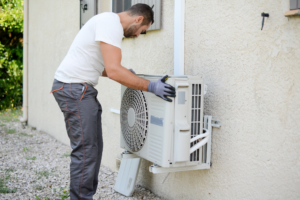Are you tired of dealing with recurring plumbing problems and escalating water bills? You’re not alone. Many property owners face similar challenges daily. However, a golden solution lies in integrating sustainable water solutions into your plumbing system. Let’s explore this in-depth.
Identifying Plumbing Challenges
If you’ve ever had a faucet that wouldn’t stop leaking or a toilet that wouldn’t flush properly, you’ve experienced some of the common plumbing challenges. The relentless drip-drip of a leaky faucet isn’t just annoying. It’s a silent killer of your wallet and the environment, wasting thousands of gallons of water each year.
Apart from leaks, low water pressure is another common issue plaguing most households. Not only can it make routine tasks like showering or dishwashing frustrating, but it could also signify deeper issues like pipe corrosion. Remember to consider Dan’s Plumbing, your professional ally in identifying and addressing these annoyances.
Also troubling are sewer system backups, which can be both messy and hazardous to your health due to the bacteria and waste matter present. Troublingly, root intrusion in your pipes or inadequate line grading may also lead to these backups, pushing unwanted matters back into your home.
Therefore, finding smart solutions to these persistent issues is crucial for optimal home maintenance, where modern green technology might offer an answer.
Importance of Sustainable Water Solutions
The Earth’s freshwater resources are continually dwindling due to overconsumption and pollution. With the ongoing impact of climate change and increasing global population demanding freshwater, sustainable water solutions have become more crucial than ever.
By embracing sustainable solutions in plumbing systems, we’re not just fulfilling your moral obligations towards nature but are also protecting future generations. The bonus? You’ll save significantly on your monthly water bill.
For instance, adopting high-efficiency fixtures like low-flow faucets and showerheads or dual-flush toilets can help reduce water use by up to 60%. Similarly, fixing even a small leak timely can save an astounding amount of water annually.
The Environmental Protection Agency (EPA) has been rigorously promoting the use of WaterSense-labeled products in homes for their water-saving benefits. As responsible citizens, you ought to work on your conservation efforts.
Water-Saving Plumbing Fixtures
The new and improved range of high-efficiency plumbing fixtures available today is amazing. A few changes here and there could make a world of difference in saving water at home. For example, installing high-efficiency toilets with dual flush options or sensor-based flushing systems can drastically cut down the water used in each flush.
Next, you have low-flow showerheads and faucets that maintain water pressure while lessening the flow. These fixtures can incredibly reduce water consumption without compromising on your comfort or convenience. High-efficiency dishwashers and washing machines also help conserve significant amounts of water.
Already considering these beautiful and effective tools? Great! They not only promise substantial water savings but also add a modern, stylish look to your home — a win-win situation!
Remember, every small step towards conservation counts in crafting a sustainable future.
Implementing Rain Water Harvesting
Capturing rainwater seems like an ancient practice, right? Yet, rainwater harvesting has been recognized by several cultures for its potential as a sustainable water source. Plus, with today’s technologies making it even easier to install and use these systems, there’s no reason not to incorporate them into your home.
Rainwater harvesting systems routinely involve rooftops, gutters, and storage tanks — catching the rainfall and storing it for future use after it is filtered and treated. This stored water can sustainably cater to many domestic applications such as flushing toilets or watering lawns.
The captivating part about harvesting rainwater doesn’t end at sustainability. It doesn’t just counter dwindling freshwater resources; it also serves as a buffer against excessive rains or floods — bolstering the effectiveness of drainage systems.
In essence, rainwater harvesting is an underused yet invaluable asset toward the quest for sustainable water solutions. By embracing it fully, we’re choosing an eco-conscious lifestyle while enjoying its numerous benefits.
High-Efficiency Toilet Systems
Resources like this site talk about water conservation which often leads to the significant amount of water toilets consume daily. To overcome this challenge and limit the water use, high-efficiency toilet systems have been introduced.
These systems use fewer gallons of water per flush as compared to conventional ones. Some high-efficiency models feature dual-flush technology – one lower volume flush for liquid waste and a higher volume flush for solids. This way, you ensure you’re using only as much water as necessary.
Apart from the dual-flush system, there’s also the pressure-assisted model which uses air pressure for a powerful but efficient flush. Although these toilets may have a higher initial cost, they easily make up for it soon with significantly reduced water bills.
With the right high-efficiency toilet in place, you’re looking at up to 60% less water consumption from each flush – a significant decline from the 3.5 to 5 gallons used by traditional ones.
Innovations in Greywater Systems
Stepping towards sustainability, people encounter another ground-breaking advance in water conservation — greywater systems. These innovative solutions separate non-potable water from wastewater and treat it for non-potable applications like toilet flushing and gardening.
Why let good water go to waste? Greywater systems tap into commonly wasted sources such as showers and washing machines. The system then purifies this wastewater through several stages — filtration, disinfection, and distribution.
While installing a Greywater system may seem a little complicated initially, the investment proves rewarding in terms of sustained water savings and encouraging eco-sustainability. a robust system can effortlessly save up to 70% of your total wastewater.
Besides offering significant savings, these systems are also beneficial during droughts or water restrictions. They enable people to utilize every drop of water prudently, minimizing the reliance on freshwater sources.
Integrating Smart Water Meters
ICMW’ or Integrated Communication and Metering for Water is an innovative solution that takes you from reactive to proactive control over your water usage. It monitors usage rates and alerts you to any unusual spikes or potential leaks in real-time.
This efficient tool gives you the power to manage your home’s water use effectively by providing accurate, timely data. By keeping track of how much your household consumes, you get a clear lens to detect any unaccounted for usage or progressive leaks – saving you gallons of water and dollars on your bill!
Not just that, these smart devices enable you to evaluate your usage pattern over time, identify peak usage periods, and effectively manage your consumption. In addition, it can provide seasonal water usage data which could be very informative in terms of understanding when and how your consumption varies.
Smart meters pave the path for smart water management by providing real-time data to homeowners. This ability to understand and control water usage at a granular level is crucial for a sustainable future.
In Conclusion
The road to sustainability is paved with conscious decisions and strategic implementations. By understanding your current consumption pattern and by embracing advanced technological solutions like energy-efficient heat pump technology, high-efficiency toilet systems, greywater systems, and smart water meters – you’re creating a substantial shift towards sustainability.
Remember, every action counts towards creating an impact and saving vital resources for future generations. Through these steps, you can craft a less wasteful and more efficient world by reducing your water footprint.




